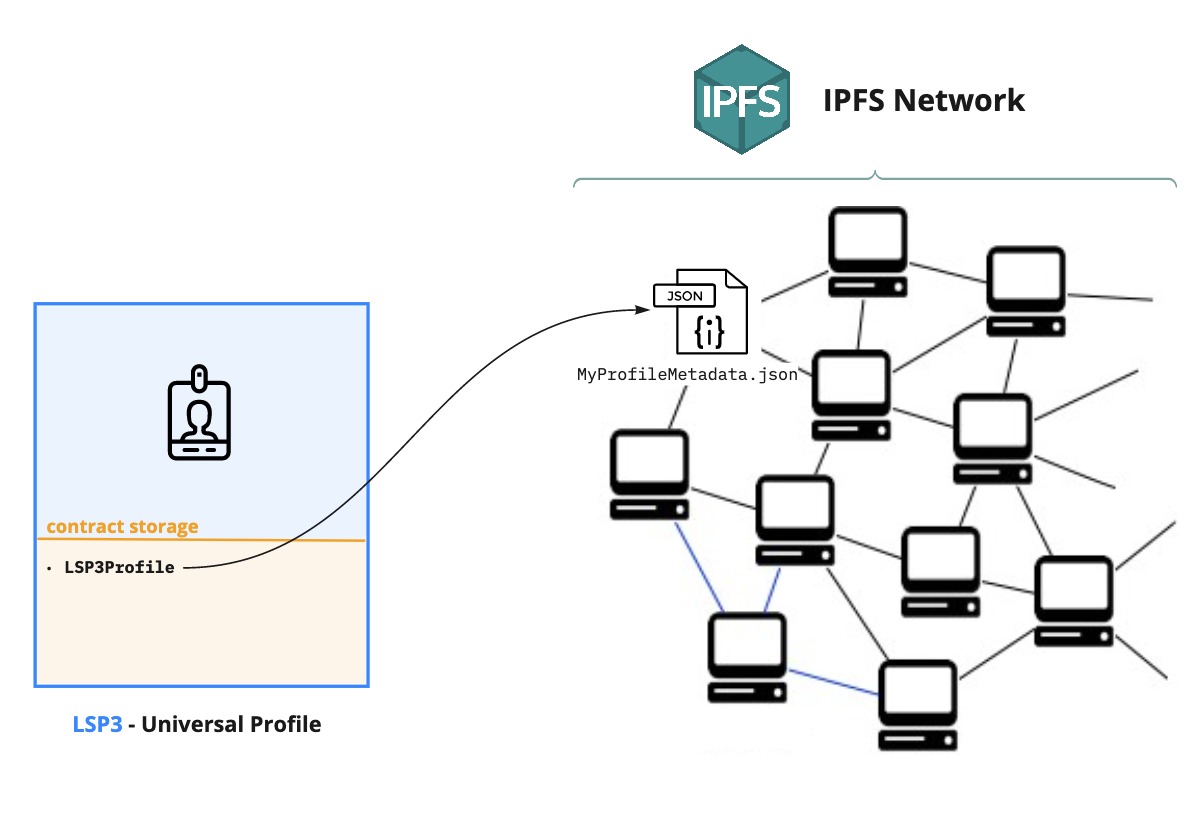LSP3 - Profile Metadata
Introduction
The implementation of the LSP0-ERC725Account standard does not contain any metadata describing the account.
LSP3-Profile-Metadata is a Metadata standard that defines specific data keys to describe a profile. A Universal Profile combines the following two standards.
- LSP0-ERC725Account: an interface for a smart contract-based account.
- LSP3-Profile-Metadata: a set of predefined ERC725Y Data keys to describe the profile.
ERC725Y Data Keys
Make sure to understand the ERC725Y Generic Key/Value Store and LSP2 - ERC725YJSONSchema Standards before going through the ERC725Y Data Keys.
SupportedStandards:LSP3Profile
{
"name": "SupportedStandards:LSP3Profile",
"key": "0xeafec4d89fa9619884b600005ef83ad9559033e6e941db7d7c495acdce616347",
"keyType": "Mapping",
"valueType": "bytes4",
"valueContent": "0x5ef83ad9"
}
This data key is used to know if the contract contains some metadata to display as a profile.
LSP3Profile
This standardised data key exists to store the metadata that represent the profile metadata of any kind of contract (e.g: a Universal Profile, a Vault, etc...). This is useful when one might want to represent a specific contract with some form of "branding" to give a profile-like aspect to the smart contract.
For instance, the metadata could represent the following in these scenarios:
- a Universal Profile: to represent an individual, a brand, a company or a DAO.
- a digital Vault: to represent a saving account, a safe contains high value NFTs, or a list of items about to be put on auction by an auction house.
{
"name": "LSP3Profile",
"key": "0x5ef83ad9559033e6e941db7d7c495acdce616347d28e90c7ce47cbfcfcad3bc5",
"keyType": "Singleton",
"valueType": "bytes",
"valueContent": "VerifiableURI"
}
The value attached to this data key is a VerifiableURI-encoded value. It represents a reference to a JSON file that describes the Profile MetaData. The file can be stored on a centralized or decentralized storage.

Inside the JSON file, the keys profileImage and backgroundImage can accept an array of images, defining an image with different dimensions, width and height. Picture scaling is helpful for client interfaces to download and serve the images with the most suitable dimensions instead of re-scale them afterward.
Example of JSON File linked to LSP3Profile data key
{
"LSP3Profile": {
"name": "frozeman",
"description": "The inventor of ERC725 and ERC20...",
"links": [
{ "title": "Twitter", "url": "https://twitter.com/feindura" },
{ "title": "lukso.network", "url": "https://lukso.network" }
],
"tags": ["brand", "public profile"],
"avatar": [
{
"hashFunction": "keccak256(bytes)",
"hash": "0x98fe032f81c43426fbcfb21c780c879667a08e2a65e8ae38027d4d61cdfe6f55",
"url": "ifps://QmPJESHbVkPtSaHntNVY5F6JDLW8v69M2d6khXEYGUMn7N",
"fileType": "fbx"
}
],
"profileImage": [
{
"address": 0x1231c7436a77a009a97e48e4e10c92e89fd95fe15, // the address of an LSP7 or LSP8
"tokenId": 0xdde1c7436a77a009a97e48e4e10c92e89fd95fe1556fc5c62ecef57cea51aa37 // (optional) if token contract is an LSP7
}
],
"backgroundImage": [
{
"width": 1800,
"height": 1013,
"hashFunction": "keccak256(bytes)",
"hash": "0x98fe032f81c43426fbcfb21c780c879667a08e2a65e8ae38027d4d61cdfe6f55",
"url": "ifps://QmPJESHbVkPtSaHntNVY5F6JDLW8v69M2d6khXEYGUMn7N"
},
{
"width": 1024,
"height": 576,
"hashFunction": "keccak256(bytes)",
"hash": "0xfce1c7436a77a009a97e48e4e10c92e89fd95fe1556fc5c62ecef57cea51aa37",
"url": "ifps://QmZc9uMJxyUeUpuowJ7AD6MKoNTaWdVNcBj72iisRyM9Su"
}
]
}
}
LSP12IssuedAssets
Universal Profiles can create digital assets, such as tokens and NFTs. All assets (tokens and NFTs) created should be registered in the LSP12IssuedAssets[] Array.
The LSP12IssuedAssetsMap:<address> can then be used to know the asset type (e.g., an LSP7 token or an LSP8 NFT) by extracting the bytes4 ERC165 interface id of the asset contract. Developers can extract this bytes4 value from the value retrieved, first 4bytes.
{
"name": "LSP12IssuedAssets[]",
"key": "0x7c8c3416d6cda87cd42c71ea1843df28ac4850354f988d55ee2eaa47b6dc05cd",
"keyType": "Array",
"valueType": "address",
"valueContent": "Address"
}
{
"name": "LSP12IssuedAssetsMap:<address>",
"key": "0x74ac2555c10b9349e78f0000<address>",
"keyType": "Mapping",
"valueType": "(bytes4,uint128)",
"valueContent": "(Bytes4,Number)"
}
LSP5ReceivedAssets
See the LSP5 - Received Assets standard page for more information.
{
"name": "LSP5ReceivedAssets[]",
"key": "0x6460ee3c0aac563ccbf76d6e1d07bada78e3a9514e6382b736ed3f478ab7b90b",
"keyType": "Array",
"valueType": "address",
"valueContent": "Address"
}
If the Universal Profile is used with the LSP6-KeyManager and LSP1-UniversalReceiverDelegate, the received assets will be automatically registered in the storage. To know how many different assets you have, you can query this data key.